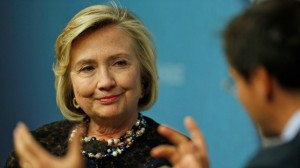
Former US Secretary of State Hillary Clinton, left, listens to Robin Niblett, right, director of Chatham House, during an event in London, Friday, Oct. 11, 2013. (AP Photo/Lefteris Pitarakis)
One of the biggest political stories today centers on whether Elizabeth Warren — who has shown absolutely no interest in running for the Democratic nomination in 2016 — will challenge Hillary Clinton, who has made it clear that she has no interest in declaring her intentions anytime soon.
Meanwhile, coming off a win in which 38 percent of New Jersey residents bothered to vote, Chris Christie is being anointed the frontrunner on the GOP side. NBC conducted a poll this week which found that he was leading a pack of… one for the nomination – they didn’t include any other candidates. But 32 percent of Republican voters said they’d back him! And only 31 percent said they’d prefer another candidate. NBC also found that were he to win the nomination, Hillary would beat him soundly.
These stories are the product of political journalists being bored writing about the rocky Obamacare rollout and Republican obstruction in Congress. They’re about writers trawling for clicks. Three years out, they’re not analyses that should be taken seriously.
After all, in November of 2009, the consensus view was that Sarah Palin was the woman to beat for the 2012 Republican nod. According to a Washington Post poll, she led Mike Huckabee by a healthy margin, with Mitt Romney coming in third. A Gallup poll from that same month found that most GOP voters – 65 percent — would “seriously consider” supporting then-Mississippi Governor Haley Barbour, edging out Palin, Newt Gingrich, Huckabee and, finally, Mitt Romney, who came in last.
Four years earlier, in 2005, Hillary Clinton was leading John Edwards and Al Gore in a crowded field of seven vying for the 2008 Democratic nomination. Not mentioned in that poll was a guy named Barack Obama, who had been introduced to the nation with a high-profile keynote address to the Democratic National Convention the previous year. On the GOP side, John McCain was trailing Rudy Giuliani and Condoleezza Rice at the time.
But the bigger problem is that speculation over who the presidential nominees will be three years from now ascribes too much power to whoever tops the ticket. For example, the question of whether Elizabeth Warren will challenge Hillary Clinton is really a proxy for discussing the future direction of the Democratic party. For five years, usually warring Democratic factions have been unified in revulsion toward the tea party’s growing dominance within the GOP. But the divide between the centrist, Clintonian wing and what the late Senator Paul Wellstone called the “Democratic wing of the Democratic Party” still simmers beneath the surface, and there will likely be a reckoning during the 2016 nominating process.
The reality is that the fight over the direction of the party will determine the ideological lean of the nominee, not the other way around. Presidential nominees tend to hew closely to their party’s median vote in Congress. If the Democrats end up adopting a more populist platform, than Clinton, if she runs, will move to the left regardless of who is challenging her. This kind of analysis is, of course, less fun than the horse race.
But another problem is that a three-year horse race is no fun at all. It’s boring. And our drawn out election campaigns, during which we’re bombarded by political ads (or at least we are if we live in contested states) may well contribute to Americans turning out to vote at an extremely low rate relative to other wealthy democracies – maybe we’re just sick of these people by the time Election Day rolls around.
In any event, here’s one vote that we declare a moratorium on 2016 speculation until at least… well, at least until the 2014 midterms are decided.


